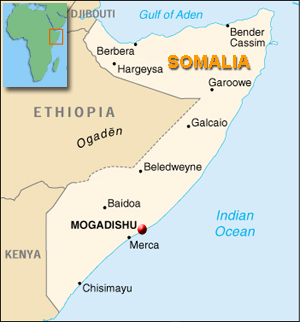|
|
SOMALIA: Extreme violence part of daily life - MSF
[ This report does not necessarily reflect the views of the United Nations]
|

? ?
|
NAIROBI, 22 Aug 2005 (IRIN) - Violence against civilians continues to be a major problem in the strife-torn Horn of Africa nation of Somalia, the international humanitarian aid organisation, Médecins sans Frontières (MSF), said on Monday.
MSF said in a statement that this year alone, it had treated more than 500 cases of violent trauma injuries in its two hospitals in the town of Galkaayo, the regional capital of central Somalia's Mudug region.
Galkaayo is divided into two halves, north and south, which fall in the separate regions of Puntland and Mudug respectively. MSF said it had been forced to operate separate hospitals in north and south Galkaayo because patients could not cross the frontline that splits it in two.
Mudug, home to some 350,000 people, is divided along clan lines into North and South Mudug. The Majeerten sub-clan of the Darod clan dominate North Mudug, while the Habar Gedir sub-clan of the Hawiye clan are in South Mudug.
"Médecins sans Frontières wishes to sound the alarm about the continuing violence in the country. The suffering of the Somali people has received little attention from aid organisations and the international community," it said.
"The frightening fact is that Somalia is officially not even at war," Colin Mcllreavy, head of the MSF mission in Somalia, said.
"This level of violence is simply a reflection of the brutality of everyday life for the people living in this country. Extreme violence has become a part of daily existence and the effect on the population is catastrophic," he added.
Many of the victims were women and children, MSF said.
The agency said from time to time, it had been forced to suspend its activities "due to violence or the threat of violence".
"Violence seriously limits the work of MSF and that of other organisations," Mcllreavy said.
"We know for a fact that the already huge number of violence-related injuries we treat are just the tip of the iceberg. Violence severely limits people's access to our medical facilities," he added.
Somalia, which has had no effective government for nearly a decade-and-a-half, has no functioning health system and some of the worst health indicators in the world. MSF said more than one in 10 Somali children died at birth and of those that survived, a quarter perished before their fifth birthday.
[ENDS]
|
|






